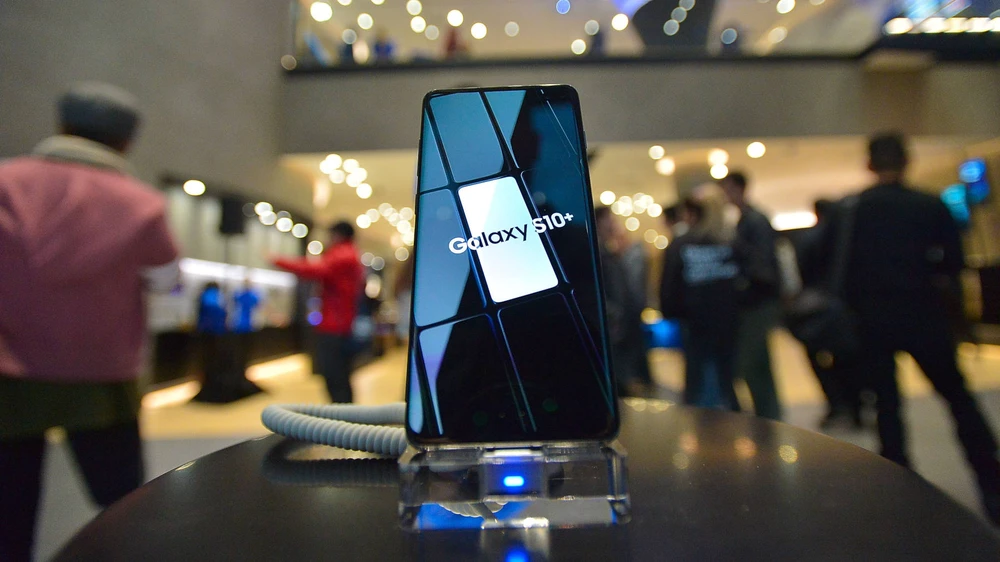
"It's like they held out this long to avoid giving the Chinese government a bad impression, but now they can't take it anymore," said a source at a major Japanese financial institution that frequently deals with South Korean companies.
Samsung kicked off the trend. With Chinese sales of its smartphones slumping in recent years -- Samsung held less than 1% of the market by shipment volume in 2018 -- it was seen as only a matter of time until the company halted production at a major factory in Tianjin.
Samsung did what it could to keep the operations going, as shutting them down would be sure to bring pressure on multiple fronts from a government keen to protect jobs. But the manufacturer ultimately gave in and decided late last year to end smartphone production at the plant.
This touched off a flood of similar moves by other South Korean businesses. "When Samsung takes the lead, the psychological burden on us is lower," an employee at a Korean company said.
Hyundai Motor in May temporarily suspended operations at a plant in Beijing capable of churning out 300,000 vehicles a year. Affiliate Kia will end production of Kia-branded autos at a Jiangsu Province factory late this month. Appliance maker LG Electronics recently moved all production of U.S.-bound refrigerators at a facility in Zhejiang Province to South Korea.
Meanwhile, Samsung is looking at deeper cuts, offering voluntary retirement packages to employees at its other Chinese smartphone factory in Guangdong Province.
South Korean companies' overexposure to China, and the concomitant risks, are not news. But the strong performance there of such businesses as Samsung and Hyundai masked these concerns for some time.
Samsung led the Chinese smartphone market back in 2012 with handsets coveted by Chinese consumers, while Hyundai ranked third in auto sales as recently as 2016, behind only Volkswagen and General Motors, thanks to its wildly popular sport utility vehicles.
But the rise of Chinese players in chips and cars -- among South Korea's biggest strengths -- has brought them down to earth. Samsung has dropped out of the top 10, while Hyundai has resigned itself to languishing in the second tier of automakers, around sixth or seventh place.
The problem was exacerbated by a row over Seoul's 2017 deployment of a U.S. missile-defense system that Beijing objected to on national security grounds. That move spurred boycotts of South Korean companies, which forced the Lotte group to pull out of the supermarket business in China.
Businesses continued to feel the aftereffects for more than a year, and just as they started to get back on their feet, the U.S.-China trade war erupted. South Korean shipments to China -- its largest trading partner, accounting for about 26% of its exports -- plunged 20% on the year in May.
U.S. sanctions against China's Huawei Technologies look likely to make matters worse. If the measures remain in place, Huawei's massive planned orders of chips from South Korean companies would need to be canceled, leading to the market being flooded with excess inventory. This would likely drag down prices, squeezing profits in Samsung's bread-and-butter semiconductor business.
Chips are the most important industry to the South Korean economy, making up 20% of its exports. Market conditions are bad enough as is -- with a decline in prices since last fall contributing to a 31% year-on-year drop in semiconductor shipments by value last month -- without the Huawei issue making the difficult situation even more so.
Furthermore, the next threatened round of U.S. tariffs on Chinese goods, which could be imposed as early as this month, covers products such as smartphones and personal computers that are South Korean specialties. The duties would directly hit South Korean businesses that import large quantities of intermediate goods such as parts into China for processing and assembly before exporting the finished goods to the U.S.
The decisions by two of South Korea's big three mobile carriers not to work with Huawei on fifth-generation, or 5G, wireless networks have rubbed Beijing the wrong way as well.




















